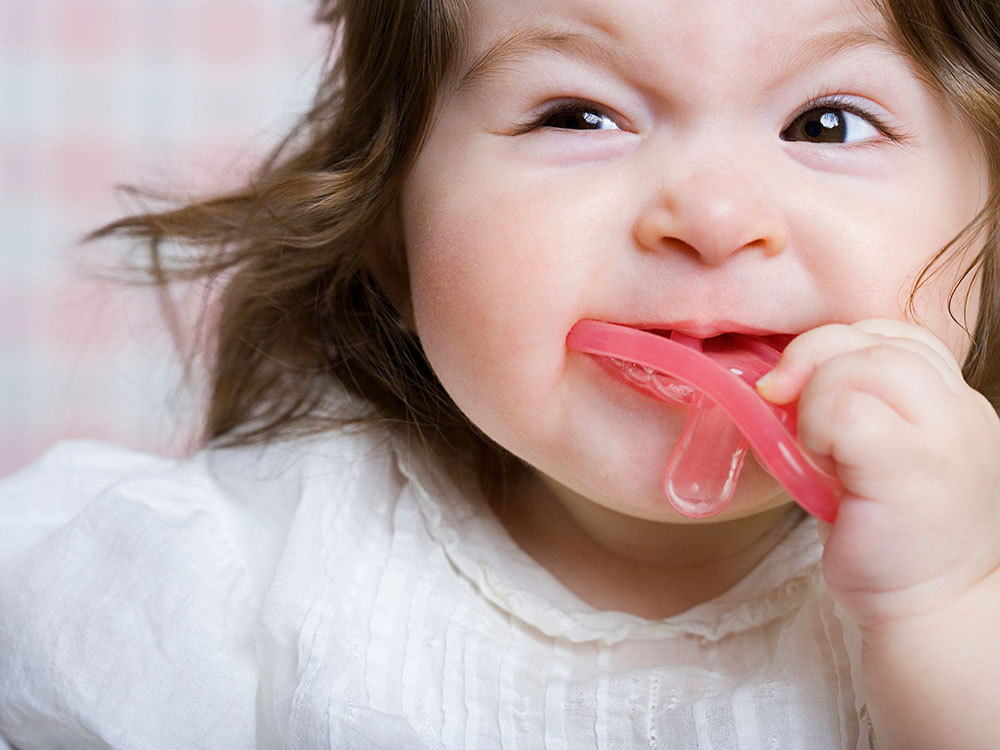(844) 5-SPEECH

Why Chewing is Important for Speech Development
February 8, 2023
Chewing plays an important role in speech development. The introduction of solids into a baby’s diet helps to promote a healthy nutritional balanced diet. Additionally, solid foods assist in developing oral motor skills. These skills include the various movements of the mouth, lips, tongue, cheek and jaw. These muscles correspond with the muscles used for the progression of speech. Furthermore, the introduction of various textures utilize different oral motor skills, which are essential for the growth of speech. For example, pureed and lumpy foods assist in promoting mastication. If parents or caregivers postpone the introduction of different textures, this can cause the infant to get accustomed to a limited dietary repertoire. The correlation between chewing and speech sounds is chewing aids in working the tongue, which is essential for various speech sounds (e.g., t,d,k, g). The implementation of solid foods into the child’s dietary repertoire assists in a robust mandible as well as the labial muscles. The labial muscles aid in keeping foods within the oral cavity as well as with bilabial sounds in speech (i.e., m, b, p).
Here is a brief overview of the developmental norms and what types of foods to introduce at each stage:
Newborns:
At this stage, babies are only able to suck and swallow, and they display an immature digestive system. As a result, breastmilk or formula is their primary source of nutrition. The jaw action used in breastfeeding helps a baby to chew.
3 months:
At this stage, babies have better head control, are able to put fingers in their mouth, and have a better range of mouth and lip movements. However, their digestive system is still immature to receive anything but breastmilk or formula as their primary source of nutrition.
4 to 6 months:
At this stage, babies now display better jaw and lip control, with the ability to move their tongue up and down which makes it easier to suck, chew and move food to the back of the mouth to be swallowed. At around 4-6 months, babies display signs that they are ready to be introduced to foods, which complements their primary source of nutrition, either breastmilk or formula. Although a baby’s digestive system is still maturing, from about 6 months, a baby needs more nutrients than breastmilk or formula alone can offer, therefore solid foods are introduced. These solid foods need to be varied, nutrient and energy dense, and have a silky smooth texture (pureed or mashed) which will make it easier to swallow and digest. It is important to note that breast milk or formula must be continued for the first 12 months of a baby’s life and always offered before solids.
7 to 9 months:
At this stage, solids should now be well established with a lumpy, mashed and finely chopped texture, as well as well-cooked or soft finger foods from about eight months (avoiding hard foods that a baby can choke on, such as whole grapes, nuts and raw carrots). With better eye-hand coordination, a baby will show interest in self-feeding, which include finger foods and the use of a spoon. Finger foods are more effective than purees to encourage chewing and development of muscles in the mouth. Additionally, babies should be encouraged to drink a little water from a cup during this stage.
10-12 months:
At this stage, solid foods can now be coarsely chopped and consist of more soft finger foods. Babies are more independent with eating and are able to chew food well, separating what needs more chewing and what can be swallowed. Their lip muscles are now stronger and are able to hold more food and liquid in the mouth. Also at this stage, babies typically demonstrate the ability to hold a cup.
One year onwards:
At this stage, children should now be eating frequently (e.g., three meals and two to three snacks a day), and a wide variety of family foods. Children now start to develop a rotary chewing movement, as well as a more stable jaw, which accommodates the action of the tongue. As children continue to grow, their motor skills become more refined and they learn more oral motor control. This is an ongoing process, which continues to develop speech.
-Babita B.
Stuff.co.nz. (2012, July 16). Why chewing is important for speech development. Stuff.
https://www.stuff.co.nz/life-style/parenting/baby/health/7089181/Why-chewing-is-important-for-speech-development
Recent News

Did What You Hear Make Sense?
March 3, 2025

The Importance of Early Intervention
January 27, 2025

How Parents Can Support Everyday Language Building
January 20, 2025

The Benefits of Support Groups for Adolescents Who Stutter
January 13, 2025

3 Common Misconceptions About Autism Spectrum Disorder (ASD)
January 6, 2025

What are Core Words?
December 30, 2024

